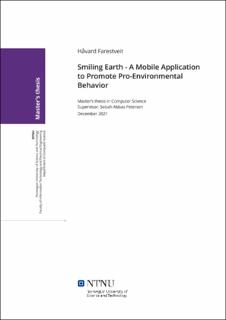| dc.description.abstract | Denne masteroppgåva presentere den tredje iterasjonen av Smiling Earth, som er ein mobil applikasjon som forsøker å påverke brukarane til å bli meir miljøvenlege, hovudsakleg ved å redusere deira karbonutslepp frå transport og energi. Forskingsmetoden "Design and Creation" har vert nytta til å designe og utvikle denne iterasjonen av Smiling Earth.
Forskingsmålet var å utvikle ein mobil applikasjon basert på sosial kognitiv teori og som nyttar verkemidlar frå sosiale applikasjonar og nettverk, til å gjera brukaren meir motivert til å redusere deira klima fotavtrykk. Innleiinga byrjar med eit grunnleggande undersøking av litteraturen, teknologi og tidlegare iterasjonar av Smiling Earth, etterfylgt av korleis den nye applikasjonen vart utvikla. Når applikasjonen var klar til bruk, vart den testa av 18 deltakarar som brukte den i ei veke. Før, medan og etter deltakarane brukte applikasjon vart kvalitative og kvantitative data innhenta frå spørjeundersøkingar, intervju, og data som brukarane sjølv genererte.
Analysen av dataa viste at funksjonaliteten frå sosial applikasjonar forbetra Smiling Earth, og hadde ein positive innverknad på brukarane sin motivasjon til å handle miljøvenleg. Masteroppgåva undersøker også korleis ein mobil applikasjon kan implementerast for å støtte sosial kognitive teori. Resultata frå evalueringa av applikasjonen viser fleire deler av applikasjonen støtter dei ulike delar av teorien, der i blant det å vere med i nettsamfunn og gi klimaløfter visa gode resultat. Frå evalueringa viser det også at nettsamfunn basert på område (t.d. Oslo, Trondheim, Bergen) og nettsamfunn basert på erfaringsdeling og interessedeling er godt egna for å motivere brukarar til å ta meir miljøvennlege handlingar. Grunna personvern omsyn har deltakarane i applikasjonen vert anonyme. Sjølv om dei fleste deltakarane sa dei vill ha føretrekt å kunne bruke sitt eige namn, viser resultata at dei synast det var lettare å samhandle med dei andre brukarane når dei var anonyme. | |
| dc.description.abstract | This thesis presents the third iteration of Smiling Earth, a mobile application that aims to promote pro-environmental behavior, specifically reducing carbon emissions from transportation and energy. The design and creation research methodology was used to design and develop Smiling Earth.
The research goal was to develop and examine user perceptions of a theoretically-driven social, mobile application created to motivate, promote, and engage citizens to reduce their carbon footprint both on an individual level and in online communities. The theoretical framework used to describe behavior change was Social Cognitive Theory. The background study presents a literature review of Social Cognitive Theory, in addition to a review of Sustainable Human-Computer Interaction and Online Communities. The background study also includes a review of the previous iteration of Smiling Earth and a technology review of developing social, mobile applications. The literature review is followed by how the application was designed, tested, and implemented. After the application was created, it was distributed to 18 users who used the application for one week. Quantitative and qualitative data were collected using questionnaires, observation, interviews, and user-generated data during the evaluation period.
Analyzing the data revealed that social computing enhanced Smiling Earth and positively affected users’ motivation to act more environmentally friendly. The thesis also examined how a persuasive mobile application can be implemented to support the key constructs of Social Cognitive Theory, including Self-efficacy, collective efficacy, observational learning, outcome expectations, and self-regulation. The results found different solutions to support the different aspects, including joining communities and making a climate action pledge. The evaluations also showed that communities based on locations (e.g., Oslo, Trondheim, Bergen), communities of interest, and communities of practice are suited to motivate users to act more sustainably. Due to privacy concerns, the participants used the application anonymously. Most of the participants expressed they would prefer the application not to be anonymous. Still, they also said they found it easier to interact with other users when not knowing their identity. | |
